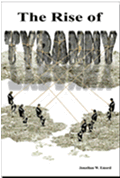MARKET INCENTIVES FOR GULF OIL CLEAN-UP
By
Attorney Jonathan Emord
June 14, 2010
NewsWithViews.com
The April 20 explosion that sank the BP oil rig in the Gulf and led to the largest environmental disaster in American history has been met with much government planning but comparatively few private sector initiatives. Some 798,000 gallons of oil (5,000 barrels) enter the Gulf each day, destroying wild life ecosystems and killing all manner of birds, seals, sea turtles, fish, crustaceans, clams, oysters, and marine mammals (including dolphins and whales). By most accounts, the efforts at containment have been marginal, at best, and may be months away from stemming the oil flow. When confronted with such an enormous catastrophe, it would seem basic, indeed logical to create incentives for industrious Americans to remove the oil from the sea and the shorelines. Consider the following option not employed by federal and state governments.
What if the federal and state governments establish a clean-up fund (into which private donors could make tax deductible contributions) that will pay any party that delivers a barrel of spilled oil to a shore side testing center for confirmation of receipt a set fee? The governments could then invite people all across the United States to retrieve the oil from the ocean in any way that does not cause ecological harm. The Coast Guard could police the waterways and shorelines to ensure that caustic chemicals were not discharged by well-meaning but misguided individuals. Millions of Americans anxious to make a difference would then descend on the shorelines and man ships to greet the burgeoning slick off the southern coast.
People would assemble clean-up parties and scoop the oil off the shoreline. People would form flotillas that would gather the oil out of the sea. Enterprising companies would employ means to remove oil from shorelines and the sea. Rather than a comparatively limited and anemic government controlled clean-up effort, the approach I recommend would unleash a mass of humanity against the problem the likes of which would equal the magnitude of the catastrophe.
The essential problem with those who govern us is that they think so little of private initiative that they distrust its ability to solve cataclysmic problems. Instead, they insist on government planned interventions under bureaucratic and military supervision which, given the breadth of this problem, will never succeed in saving the Gulf ecosystem from damage that will likely last for decades, if not a century or more. That outcome need not be. The solution lies in numbers. If enough people on the shore and at sea work to remove the oil, the damage will be mitigated substantially. To make it worth their while, we need only channel tax deductible contributions to a federal and state fund from which monies can then be doled out to those who present oil retrieved. In the end, BP could be required to contribute to this fund as part of a settlement or a court ordered resolution.
Americans are anxious to make a difference in the Gulf. Presently they are pouring money into relief efforts, but they would make a much larger difference if they were given incentives to go to the shoreline, help rescue the animals in mortal peril, and help remove the oil wherever it is found. The answer lies in creating an incentive for large numbers of Americans to invest time, ingenuity, and effort in saving wildlife and removing oil from the waters and shores.
Because modern political leaders campaign on promises to cure all ills with government spending and power, it shocks the conscience of the typical American when government is utterly incapable of addressing a crisis. In truth, government usually fails in resolving crises.
| Subscribe to the NewsWithViews Daily News Alerts! |
Government planning almost never succeeds and, so, it should come as no surprise that the present government efforts are too little, too late in addressing the BP oil catastrophe. By contrast, private ingenuity (the genius of a free people) proves daily, as the late economist Julian Simon first explained in detail, that the human mind is the ultimate resource and can solve all manner of problems if only we trust in it and create a climate hospitable to it.
� 2010 Jonathan W. Emord - All Rights Reserved

















